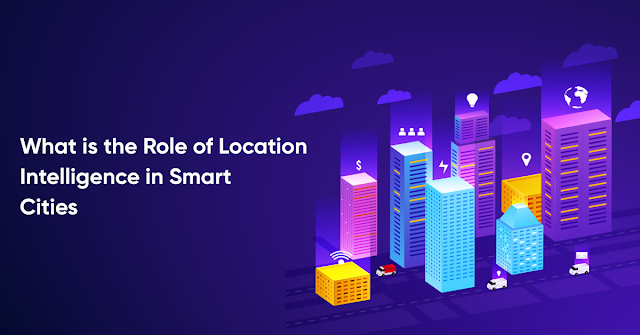What is the Role of Location Intelligence in Smart Cities?
Recently, urbanization is sweeping across the globe, drawing an increasing number of people into cities. Yet, with this urban influx comes a surge in urban challenges. The concept of Smart Cities has arisen to combat these issues and strive for better urban living. These Smart Cities promise to leverage technology to improve the quality of urban life. At the core of this change lies Location Intelligence, a dynamic tool that holds the key to solve complex urban problems. This post embarks on a journey to unveil the profound role of Location Intelligence in shaping future cities. From optimizing traffic flow to enhancing public services and ensuring environmental sustainability, Location Intelligence is pivotal in reshaping urban landscapes for the better.
What Is Location Intelligence?
Location Intelligence (LI) is like using maps and location data to solve problems in various industries. It relies on Geographic Information Systems (GIS) technology to offer both analysis and practical solutions for businesses and governments. Location Intelligence involves gathering and studying vital data, like GPS coordinates, transaction records, and sales data, to understand location-based insights deeply.
Businesses can use Location Intelligence to break down complicated situations and develop solutions for their typical problems. Many companies use GIS technology to make the most of Location Intelligence. GPS helps organizations find new options, smooth operations, and make better decisions based on location-related data.
Advantages of Location Intelligence in Smart Cities
Here are some of the key Advantages of Location Intelligence in smart cities:
Strategic Analysis
Location Intelligence can help your organization spot good opportunities when planning. Also, it facilitates seamless communication and collaboration from production to delivery. Location Intelligence helps people in charge to invest their money wisely in sales and network activities, aiming for a good return on investment. It can lead to setting prices more accurately and predicting how much profit you will make.
Trend Monitoring
With the right data and keeping an eye on things, organizations can spot and react to trends in business, the economy, and society. This information can also help them predict risks and opportunities.
Targeted Marketing
When a company understands its customers well, it can market and sell products more efficiently. Companies gather extensive data about individuals, including their locations and financial status, which enhances their understanding of customers and enables more precise product sales strategies.
Company Insurance
Location intelligence helps companies match their values with the local community. It also makes it easy to check and improve the company's reputation in the market.
Which Industries Use Location Intelligence?
Numerous industries harness the power of Location Intelligence, including:
Insurance
For insurance companies, location intelligence means using maps and data to work smarter. They can make better policy decisions, prepare for natural disasters, and lower risks. It helps both the insurance company and the people who have insurance.
Public Sector
In the public sector, Location Intelligence is vital. It helps government agencies use their resources well. For example, the police can send officers to places they are most needed, keeping people safe. Also, governments can use Location Intelligence to find and stop any money misuse, making the way they work more open and responsible.
Financial Services
Banks and financial companies use location intelligence to determine where to put their branches and ATMs. They also use it to prevent fraud (when someone steals your money) and offer their customers special deals.
Retail
Stores use location data to understand how people shop. They can put products in the right places and send special offers to phones when customers are in the store. They also use it to manage their inventory (everything they have to sell) best.
Customer Experience
Significant places like stadiums, resorts, and airports use location data to improve our experience. They help us find our way, get things faster, and manage lines for things like restrooms. It is all about making our time there more enjoyable.
Higher Education
Universities use location data to make their schools better. They can find the best students, keep track of their graduates, and map their campuses.
How Does Location Intelligence Work?
Here's a simplified explanation:
Data Collection
Location data is sourced from various outlets, including GPS devices, smartphones, sensors, and geographic databases. This data can encompass data regarding people's current locations, travel paths, or destinations they frequent.
Data Processing
Once collected, this data is processed and organized. It can involve cleaning up the data, sorting it, and preparing it for analysis.
Data Analysis
Location data is then analyzed to find patterns, trends, and meaningful information. For example, retailers might use it to see which products are famous in various locations.
Visualization
The analysis results are often presented visually, like on maps or charts, to make it easier to understand.
Decision Making
Businesses and organizations use these insights to make better decisions. For instance, a city might use location data to plan more efficient public transportation routes.
How Does Location Intelligence Address Urban Challenges?
Location Intelligence addresses urban challenges using geographic data and technology to tackle various city issues. Here's how it works:
Urban Planning
Location Intelligence helps city planners make better decisions. It can show them where to build new homes, roads, and businesses. This way, cities can grow in an organized and efficient way.
Economic Development
Businesses can use Location Intelligence to choose the best places to open stores and offices, creating more jobs and services for the city.
Traffic Management
Location Intelligence helps ease traffic problems. Analyzing traffic data can suggest when and where to build new roads or change traffic lights to reduce congestion.
Transportation
It optimizes public transportation routes, making it easier for people to get around the city.
Emergency Response
In times of disaster, Location Intelligence is vital. It helps emergency services find the quickest routes to help people in need. It also identifies areas at high risk of disasters.
Environmental Sustainability
It aids in safeguarding the environment. By identifying areas with pollution issues or high risk of natural disasters, cities can take actions to minimize harm and develop green spaces.
Public Health
Location Intelligence can track the spread of diseases and guide health authorities to respond effectively. It also helps identify areas needing more healthcare facilities.
Housing and Real Estate
For housing, it assists in choosing the best locations for new homes, making housing more accessible and affordable.
Crime Prevention
Location data helps enhance urban safety. It analyzes crime patterns and predicts potential trouble spots. Law enforcement can allocate resources more effectively based on this data.
Conclusion
In conclusion, Location Intelligence is vital in making cities smarter and better for everyone. It helps us solve many city problems, like traffic, pollution, and safety. With Location Intelligence, cities can plan and grow in a more organized way, making life in cities more comfortable. With Location Intelligence, cities can become places where people can live, work, and enjoy life more easily and sustainably.



Comments
Post a Comment